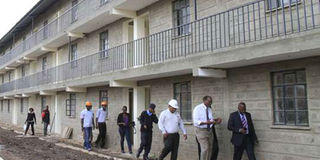Firm to build 20,000 houses for civil servants

Kenya Railways and World Bank delegation visit housing units in Makadara on November 4, 2014. More houses will be constructed through a partnership between China and Kenya. PHOTO | JEFF ANGOTE | NATION MEDIA GROUP
What you need to know:
The agreement means that the government will provide land on which the units will be built by CCECC, with funding from the CAD-Fund.
The CAD-Fund often puts money in projects run by Chinese firms in Africa even though it traditionally doesn’t hold controlling stakes in those firms.
Government workers are set to benefit from a housing project funded by a Chinese private equity fund that will see about 20,000 houses built.
It follows a deal signed on Thursday between the government, the China-Africa Development Fund (CAD-Fund) with local housing firm Suraya Property Group and China Civil Engineering Construction Company (CCECC).
State officials say the project will help reduce the deficiencies in sheltering its workers.
The agreement means that the government will provide land on which the units will be built by CCECC, with funding from the CAD-Fund.
“The partnership is such that the government provides land, we provide consultancy, and the CAD-Fund and CCECC provide funding and also provides construction. The government also manages the end products,” said Suraya Group CEO Pete Muraya after the signing ceremony in Nairobi.
“We are also addressing all types of housing, where we are targeting maybe a million shillings or less and we are going up to the senior civil servants who may want, maybe a bigger house on a quarter of an acre,” he added.
The construction of 20,000 housing units could help improve the shortage of shelter for government workers, especially in Nairobi.
The project targets the police, civil servants, military, parastatal officials and county government workers.
But Transport and Infrastructure CS James Macharia admitted there is a huge deficit.
“This project, we believe, is very timely. It will be a catalyst for many other projects,” Mr Macharia told an audience at the Crowne Plaza.
“Joint ventures and public-private partnerships can help bridge the gap. For us in government, we shall provide enough incentives, and we need all these partners to compliment and support our efforts.”
The shortage of housing in the country means Kenya needs at least 200,000 units every year.
However, the cost of construction has put off most investors and only 50,000 units are put up annually, according to the Transport and Infrastructure Ministry.
COMPANY'S PORTFOLIO
The cost of land in Nairobi, for example, takes about half the construction cost, meaning the end products are often very expensive, said Mr Muraya.
Within the government itself, the police require about 69,000 more houses to shelter all officers, yet the government has only built 1,000 in the past four years.
The project signals the intent of the Chinese to establish base in Kenya by supporting their own enterprises.
The CAD-Fund, China’s largest private equity fund that is controlled by China Development Bank, officially opened its representative office in Nairobi on Thursday.
Chi Jianxin, CAD-Fund’s chairman, told reporters the Nairobi office will also be used as a regional headquarters for the eastern Africa region, making it the fourth such office set up in Africa since 2006.
“We do not currently have many investments in Kenya but after the establishment of this regional office. We want to set this Kenya office as the headquarters of the region,” he said.
“It provides a big advantages for Kenya as we can improve the local exports by directly investing in firms here.”
The fund was launched in 2007 as part of China’s "Eight Measures" to venture into Africa by then Chinese President Hu Jintao, following the Beijing Summit on China-Africa Cooperation in 2006.
It had an initial capital of $1 billion (Sh100 billion) from China Development Bank but raised it to Sh500 billion ($5 billion).
The CAD-Fund often puts money in projects run by Chinese firms in Africa even though it traditionally doesn’t hold controlling stakes in those firms.
It has participated in projects around Africa in glass manufacturing, cement (Ethiopia), a power station (Ghana), a port project (Lagos, Nigeria) and an industrial park (Egypt).
This is its first project in Kenya.
Edited by Philip Momanyi





